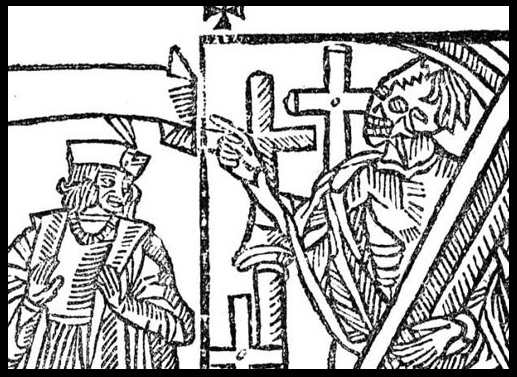
Everybody by Branden Jacobs-Jenkins
directed by KT Turner
dramaturgy by Ariana Burns
(Section of frontispiece from edition of Everyman published by John Skot c. 1530.)
Five Wits
The Five Wits are considered synonymous with the five senses. There were even doctrines that placed the senses in a hierarchical order based on their moral standing.
In Sound, Body and Space: Audience Experience in Late Medieval English Drama, Clare Wright wrote this top-down system was derived from Aristotelian philosophy and that:
Because of their associations with light, truth, knowledge and understanding sight and the eyes were perceived as the most respectable of the senses. At the opposite end of the spectrum was touch, the basest of man's perceptions (Wright p23).
Friendship
Everyman and Elckerlijc found inspiration from a Buddhist parable about false friends (Poláčková p 325; Williams). Everyman and Everybody, in their eponymous plays, look for someone to accompany them to their reckonings with God but are hard pressed to find a companion. Conley in his paper on “The Doctrine of Friendship in Everyman” wrote that friendship had to be tried with adversity to be proven its worth in medieval times. A true friendship was lasting, and then it would be called virtuous “indeed supernatural- a gift of God” (Conley). This last trait made it something of great value. Conley continued that true friendship: “…provides counsel and comfort pertaining not only to this life but also to the next life” (p 382).
This value on true friendship was added to the plot of Everyman which taught the necessities for salvation.
Conley, John. “The Doctrine of Friendship in Everyman.” Speculum, Jul., 1969, Vol. 44, No. 3, pp. 374-382. University of Chicago Press on behalf of the Medieval Academy of America. www.jstor.org/stable/2855500. Last Accessed: Jan 15, 2021.
Poláčková, Eliška. “Mutato Nomine Dicor Nunc Homulus Latin Translation of The Morality Play of Elckerlijc.” Listy filologické / Folia philologica, 2011, Vol. 134, No. 3/4, pp. 323-339. Centre for Classical Studies at the Institute of Philosophy of the Czech Academy of Sciences www.jstor.org/ stable/23468757. Dec 2, 2020.
Williams, Arnold. “Reviewed Work(s): A Study of Everyman with Special Reference to the Source of Its Plot by Genji Takahashi.” Speculum. Vol. 28, No. 3 (Jul., 1953), pp. 616-617. University of Chicago Press on behalf of the Medieval Academy of America. www.jstor.org/stable/2847061. Last Accessed: 11-01-2021 20:03 UTC.
Wright, Clare. Sound, Body and Space: Audience Experience in Late Medieval English Drama. PhD thesis, University of Nottingham. 2011. Access from the University of Nottingham repository: http://eprints.nottingham.ac.uk/13108/1/555408.pdf. Last accessed: Jan 1, 2021.